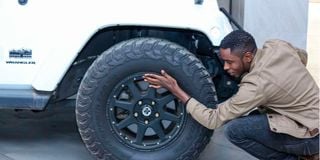Julius Mbura: I’m blind but I can help you pick a good car

Julius Mbura touches a vehicle at a showroom in Nairobi. Despite being blind, Mbura reviews cars.
Having mastered his way around the shared work space, Julius Mbura introduces his colleagues by name in their sitting positions, confidently taking steps towards a balcony, his white cane at hand.
He is a lawyer and a car reviewer.
Mbura lost his eyesight twice due to a condition known as maculopathy, which is characterised by progressive loss of central vision when the macula – main area at the centre of the retina associated with sensitive and accurate vision – is affected. The first time he lost his sight he was only 10.

Julius Mbura, a visually impaired law graduate. He now reviews cars by touch and feel, largely as a passion.
Losing his sight, he says, crushed some of his dreams as he always aspired to be a pilot or operate automotive machines. Growing up, he was drawn to heights and vehicles. He would draw cars he admired on the roads way before he could put a label on them.
“I have loved cars since I was a child. If I regained my sight today I want to be behind the wheel, heading somewhere just to experience the thrill. When I first lost my sight I was so devastated by the fact that I would never drive,” he said.
A few years later, he regained his eyesight but completely lost it again in 2019, which saw him push boundaries and venture into content creation.
“I want to break the barriers. I am taking risks in spaces that are restricted to abled people. I wish to break the walls of stigma planted by society about disabled people,” he says.
Mbura says losing his sight helped his other sensory organs to improve greatly, making him adept at reviewing cars by touch and feel.

Julius Mbura, a visually impaired law graduate. He now reviews cars by touch and feel, largely as a passion.
“My hands become my eyes and I am able to interpret the body lines and the contours of the car such that I do not have to touch the emblem for me to know which car it is,” he says.
It is only through paying attention to sound that he can make sense of his surroundings.
It was his experience at the university that spurred his desire for autonomy. He started learning how to skate, cycle and drive. Yes, you read that right, he learned how to drive.
Mbura drives in controlled areas, though he has to be assisted by a friend or his wife in the passenger seat.
Also Read: The man who smells like fish
He says assistive and digital accessibility technology have a major boost to his quest for independence – he can tweet on his computer without assistance.
His phone and computer have software installed that verbally prompt him to act, such as when he is transacting, reducing his dependence on other people.
Mbura has gone a step further to help others who are visually impaired increase their independence. He works with inAble, a non-governmental organisation that works to empower people living with disabilities through assistive technology..
Using a white cane, he walks into a car dealership yard that he has partnered with in Nairobi to review the vehicles as part of firms marketing activities.
He started out by reading about cars, listening to other car reviewers on YouTube and following automotive journalists to understand the basics of the trade.
To him, car reviewing is both a serious undertaking and a form of entertainment. He describes the unique features of the different car but also reveals their downsides.
Also Read: Here’s why spare parts cost an arm and a leg
“I describe the car and its features. I tell clients what options they have. I give them information on what to look out for before they make a purchase,” he says.
Though stigma towards people with disabilities is still rife, Mbura says it doesn’t have to be limiting.
“Even with disability, you can be something if you fight the attitudinal and environmental barriers,” he said.
Shifting perceptions about people who are physically challenged is a key goal for Mbura. He wishes to become a beacon of hope for people living with disabilities across the East African region and beyond.
“I want to push for inclusion in the automotive scene,” he says, adding that car manufacturers should incorporate features that work well for people who are physically challenged by tapping into technology.





